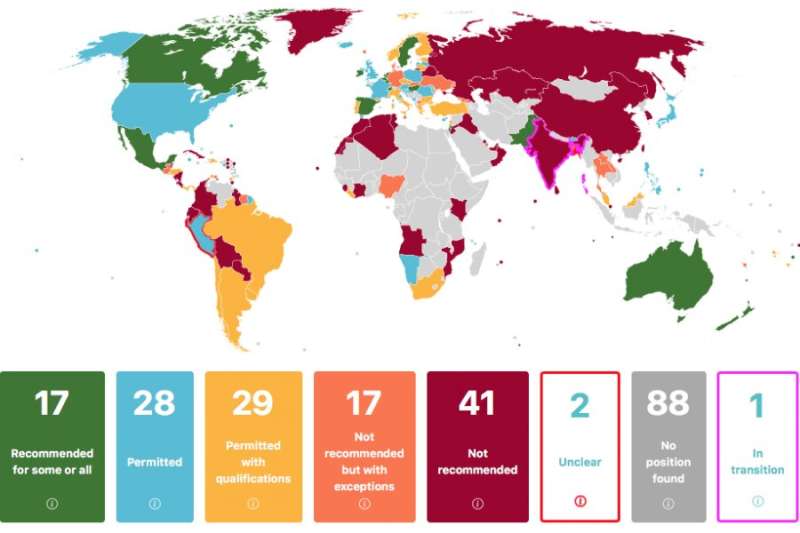
Although pregnant people are at elevated risk of severe COVID-19 disease and death, countries around the world vary widely in their policies on COVID-19 vaccination in pregnancy, with 41 countries recommending against it. Currently, 91 countries have policies that allow for at least some pregnant people to receive COVID vaccines—45 of which broadly permit or recommend vaccines in pregnancy—according to Johns Hopkins University’s COVID-19 Maternal Immunization Tracker, or COMIT, a newly launched online resource providing a global snapshot of public health policies that shape access to COVID-19 vaccines for pregnant and lactating people.
“Data about COVID vaccines’ safety for pregnant people and their offspring have generally been reassuring. But countries around the world have taken a variety of positions on COVID vaccination and pregnancy—ranging from highly restrictive policies that bar access to vaccines, to permissive positions in which all pregnant or lactating people can receive vaccine and, in some cases, are recommended and encouraged to do so,” said Ruth Karron, director of the Center for Immunization Research at the Johns Hopkins Bloomberg School of Public Health and a professor in the school’s Department of International Health.
COMIT is the first resource that provides a global snapshot of public health policies that influence access to COVID-19 vaccines for pregnant and lactating people, enabling users to explore policy positions by country and by vaccine product. Through maps, tables, and country profiles, COMIT provides regularly updated information on country policies as they respond to the dynamic state of the pandemic and emerging evidence.
“This is an extremely valuable resource for anyone concerned with the health of pregnant women and their offspring anywhere in the world. By compiling and updating countries’ policy positions regarding COVID-19 vaccination for pregnant and lactating people, COMIT makes it possible to track at a glance the ongoing global changes in this rapidly changing sphere,” said Alejandro Cravioto, chair of SAGE, the international panel of experts making COVID-19 vaccine recommendations to the World Health Organization.
In the past month alone, seven countries have joined the ranks of those with policies recommending COVID-19 vaccination for pregnant and lactating people.
“The variability in policy positions is in part a consequence of the absence of evidence on vaccines in pregnancy, because pregnant and lactating people are excluded from the vast majority of clinical trials. As a result, public health authorities and recommending bodies are developing guidance on COVID vaccines and pregnancy with far less evidence than they have for most other populations,” said Ruth Faden, founder of the Johns Hopkins Berman Institute of Bioethics. “Our hope is that COMIT might convince policy makers worldwide to expand access to vaccination for pregnant people. We are seeing some momentum in that direction, but we need to see more.”
The COMIT team notes that varying policies regarding vaccination of pregnant people could have serious implications for gender equity in the global rollout of COVID-19 vaccines, including among the high-priority group of health workers who would otherwise be first in line to receive vaccine.
“In many countries, the health system is hugely dependent upon female health workers in their reproductive years, many of whom are pregnant or breastfeeding. If they cannot be adequately protected from serious COVID-19 disease or death, it would not only be a threat to a gender-inclusive response, but potentially set back the health system during a crucial time in the response and for years to come,” said Carleigh Krubiner, a Berman Institute faculty member and a policy fellow at the Center for Global Development.
COMIT’s interactive global map conveys at a glance whether pregnant or lactating individuals are allowed or encouraged to receive any vaccine currently authorized for use in individual countries. Other features include:
- Tables that enable visitors to compare vaccine policies across countries, including any special requirements (e.g. a doctor’s note), with various sort and filter features to understand how individual country policy positions compare across geography and vaccine products.
- Maps that filter by product and policy position, with an easy toggle between pregnancy and lactation to see how recommendations differ for pregnant and breastfeeding individuals
- Individual country pages that give a detailed account of policy positions, and changes over time, and provide links to source documents.
“The COMIT website will be an invaluable source of information for policymakers around the world as the COVID-19 vaccine rollout continues,” said Chizoba Barbara Wonodi, a faculty member in the Department of International Health and Nigeria Country Director at the School’s International Vaccine Access Center. “Even as the COVID vaccination rate in the United States approaches 50%, only about 6% of the world’s population has been fully vaccinated to date. This inequity in access needs urgent global attention.”
Source: Read Full Article